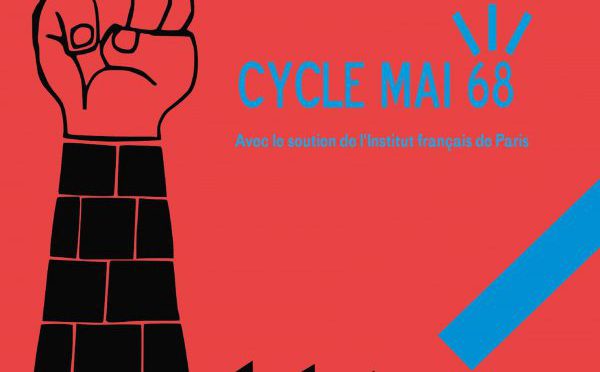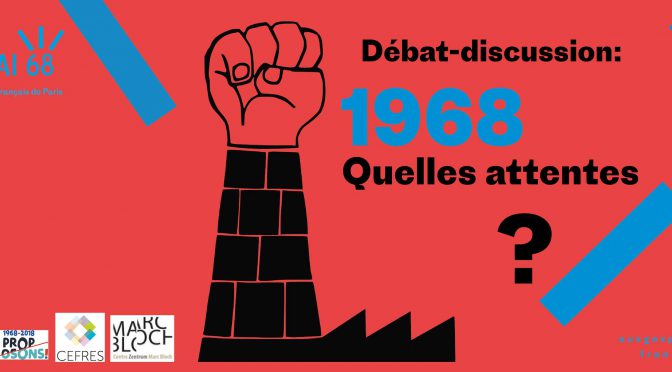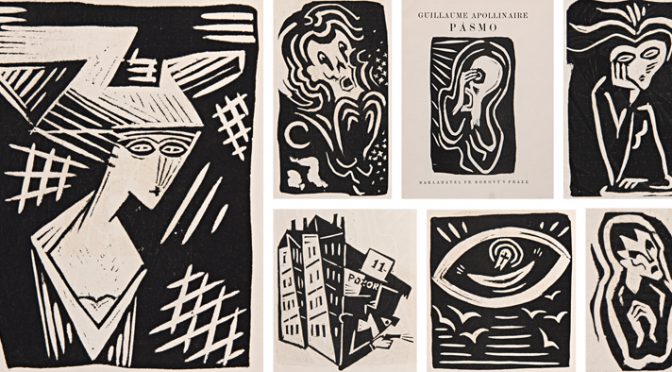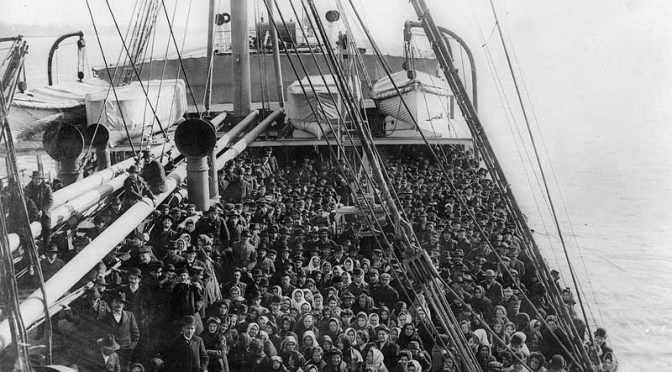
Seventh session of the 2018 common epistemological seminar of CEFRES and IMS FSV UK led by
Lucie Trlifajová (FSV UK / associate at CEFRES)
Regaining Control, Reconstituing Citizenship: Welfare Policies in Decaying Regions
Where: CEFRES – Na Florenci 3, Prague 1, 3rd floor, entrance C
When: Thursday 17 May 2018 from 3:30 pm to 5 pm
Language: English
Text:
- Yuval-Davis, Nira. Introduction. Framing the questions, in: (id.) The politics of belonging: Intersectional contestations. Sage 2011, pp. 1-25.

Venue & time: Marc Bloch Center (Germaine Tillion room, 7th floor, Friedrichstr. 191, Berlin), from 10 to 5:30 pm
Organizers: Catherine Gousseff (Marc Bloch Center – CMB), Sylvie Robic (Nanterre University), Clara Royer (CEFRES), Dominique Treilhou (French Institute in Berlin)
Partenaires : CMB, French Institute in Berlin, Paris-Nanterre University and CEFRES
Languages: French, German and English
This conference takes place within the May 68 Cycle taking place in Nanterre, Berlin and Prague, which centers around conferences, round tables, exhibitions and screenings dedicated to the year 1968.
From the Berlin February demonstration against US involvement in the Vietnam War, through the March student protests in Poland and the student unrest in Italy, to Prague Spring or French May ’68, a insurgent spirit swept across the European continent in 1968. The chronicle of the events that shook in different ways European societies, suggests the existence of a rebellious impetus that ignored the Iron Curtain and defied the various political regimes in place. The 1968 new generation held a common ground as they dared asserting their aspirations, upsetting the established order. Still, the diversity of protest configurations, whether speaking of the actors engaged in them or of the political answers prompted by the events, calls for a confrontation of these historical moments which, caught between celebration and tragedy, have become engraved in collective memory.
On the 15th of May, witnesses of 1968 from various parts of Europe will speak about the expectations they had then.
The next day, on the 16th of May, the conference will propose a reflection between East and West through the gathering of specialists on three major topics: violences in 1968, the emergence of women’s movements and the birth of alternative cultures.
What disparities, what common trends can be perceived in the rebellious spirit of 1968?
Continue reading May 68 Cycle Prague/Berlin – West Winds, East Winds →

Round table
Venue and time: French Institute in Berlin, Boris Vian room (Kurfürstendamm 211, Berlin), at 7 pm
Partners: Marc Bloch Center (CMB), French Institute in Berlin (IFB), CEFRES and Nanterre University, with the support of the French Institute in Paris
Organizers: Catherine Gousseff (CMB), Sylvie Robic (Nanterre), Clara Royer (CEFRES), Dominique Treilhou (IFB)
Languages: French, German (with simultaneous translation)
This round table is part of the Cycle Mai 68, a cycle with screenings, debates, workshops and exhibitions around the 50th anniversary of the events of 1968.
With the participation of witnesses of the European events of 1968 :
- Libuše Černá (Czech Republic)
- Jan Gross (Poland)
- Jean-Yves Potel (France)
- Peter Schneider (Germany)
Moderator: Thomas Wieder (Le Monde)
For more information on Cycle Mai 68, see here
See the other events of Cycle Mai 68: the international conference West Winds, East Winds and a concluding conference in June in Prague.
See the whole program of May 68 Cycle here

As the exhibition Notre France. La poésie française dans les traductions et les illustrations tchèques du XXe siècle, organized by the Museum of Czech Literature is about to open on 11th of May in Hvězda Summer Palace in Prague, CEFRES organizes a roundtable around the translation of poetry. The exhibition, open until the 31rd of October, 2018, is organized in the frame of the « 2018 European Year of Cultural Heritage » program and of the project “Un Siècle commun” [A Shared Century].
Venue: French Institute in Prague, 5th floor (Štěpánská 35, Prague 1 110 00)
Time: 6-8 pm
Language: French
Speakers:
- Robert Kolár (ÚČL AV ČR)
- Guillaume Métayer (CELLF-CNRS)
- Jiří Pelán (FF UK)
- Jovanka Šotolová (FF UK)
Chairs: Antoine Marès (Université Paris 1 Panthéon-Sorbonne) and Clara Royer (CEFRES)
Illustration: Linocuts by Josef Čapek for Pásmo (Zone), 1919, by G. Apollinaire, translated into Czech by Karel Čapek

Sixth session of 2018 common epistemological seminar of CEFRES and IMS FSV UK led by
Florence Vychytil-Baudoux (CEFRES – EHESS)
Transborder Societies : Diaspora and its Limits as an Analytical Concept
Where: CEFRES library – Na Florenci 3, 110 00 Prague 1
When: Thursday 03.05.2018 from 3:30 pm to 5 pm
Language: English
Text:
- Rogers Brubaker, “The ‘Diaspora’ Diaspora”, Ethnic and Racial Studies, 28.1 (Jan. 2005), pp. 1-19.

Fifth session of the 2018 common epistemological seminar of CEFRES and IMS FSV UK led by two PhD students:
Jan Koutník (FSV UK): Competitive Authoritarianism
and
Jamal Yazliyeva (FSV UK): Media Censorship
Where: CEFRES library – Na Florenci 3, 110 00 Prague 1, 3rd Floor, Entrance C
When: Thursday 19. 4. 2018 from 3:30 pm to 5 pm
Language: English
Texts:
- Levitsky and Way, Competitive Authoritarianism: Hybrid Regimes after the Cold War, Cambridge University Press, 2010, p. 1-36.
- Irum Saeed Abbasi and Laila Al-Sharqi, “Media censorship: Freedom versus responsibility. Review”, Journal of Law and Conflict 7(4), August 2015, p. 21-25.





